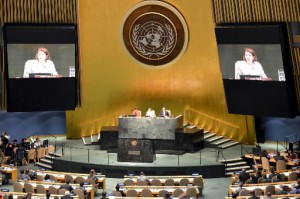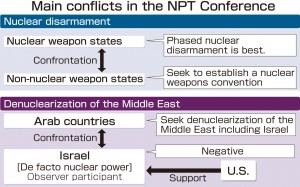NPT conference is unable to adopt final document due to lack of consensus over Middle East denuclearization
Jun. 1, 2015
by Michiko Tanaka, Staff Writer
NEW YORK--On May 22, the Review Conference of the Nuclear Non-Proliferation Treaty (NPT) collapsed and closed on its final day after a four-week session at United Nations headquarters in New York. No final document with measures to steer the world toward nuclear disarmament was adopted for the next five years. Issues including the establishment of a nuclear-weapon-free zone in the Middle East, aimed at denuclearizing Israel, stirred discord among the member states that could not be resolved. Israel, a non-signatory to the NPT, is assumed to possess nuclear weapons. In this milestone year, which marks the 70th anniversary of the atomic bombings of Japan, the international community could not produce the outcome that A-bomb survivors have long desired: a world free of nuclear weapons.
Regarding the final draft of the outcome document distributed by Conference President Taous Feroukhi, from Algeria, in the early hours of this day, the afternoon plenary meeting focused on a section stating that the Review Conference entrusts the secretary-general of the United Nations to convene an international conference no later than March 1, 2016 to discuss the establishment of a nuclear-weapon-free zone in the Middle East. Rose Gottemoeller, the Under Secretary of State for Arms Control and International Security for the U.S. State Department, quickly refused to accept the final draft, saying that holding such a conference is “unrealistic and unworkable.” Her response demonstrated careful consideration for Israel, which the United States publicly stands by. She also criticized Egypt, calling it by name, for refusing to alter the wording of the text. As the final document of the NPT Review Conference must, in principle, be adopted unanimously, the failure of the conference became a foregone conclusion. The delegates from the United Kingdom and Canada also expressed their opposition to holding the Middle East conference.
Egypt, which sets the tone for other Arab countries, retaliated in turn by stating that the United States was blocking an agreement to pursue a nuclear-weapon-free zone in the Middle East. Egypt also stressed that the denuclearization of the Middle East has not yet been properly addressed since the 1995 Review Conference adopted the “Middle East Resolution” on a Middle East zone free of nuclear weapons and other weapons of mass destruction 20 years ago, lamenting that it was a sad day for the NPT.
Concerning nuclear disarmament, a deep division between the nuclear weapon states and the non-nuclear weapon states was exposed over the idea of outlawing nuclear weapons. Language which mentioned a nuclear weapons convention, which had remained intact in the draft report from Main Committee I (Disarmament), was removed from the draft of the final document. At that day’s plenary meeting, voices of dissatisfaction over a lack of progress involving nuclear disarmament, the rollback of the substance found in the final document from the previous Review Conference, and the failed expectations of this year’s gathering were heard from the non-nuclear nations, one after the next.
Meanwhile, Austria, one of the countries that have spearheaded discussions on the inhumanity of nuclear weapons, announced that 107 states have endorsed a joint statement known as the “Humanitarian Pledge,” which was submitted to the conference. The representative from Austria declared that these states would pursue effective measures to fill the legal gap to ban and eliminate nuclear weapons. It is expected that efforts toward a ban on the use of nuclear weapons will intensify.
Keywords
NPT regime
The NPT regime is an international security arrangement based on the Nuclear Non-proliferation Treaty (NPT), which came into effect in 1970. The treaty limits the holders of nuclear weapons to the victors of World War II--the United States, Russia, the United Kingdom, France, and China--and prohibits other nations from possessing nuclear arms. With the principle of realizing the eventual abolition of nuclear arms, the treaty imposes on the nuclear powers the obligation to pursue nuclear disarmament, while it grants non-nuclear nations the right to the peaceful use of nuclear energy. As the treaty limits the nuclear weapon states to these five countries, it is criticized as unfair. India, Pakistan, and Israel have not joined the treaty and are manufacturing and stockpiling nuclear weapons. North Korea, which continues to develop its nuclear program, withdrew from the treaty in 2003.
(Originally published on May 24, 2015)
NEW YORK--On May 22, the Review Conference of the Nuclear Non-Proliferation Treaty (NPT) collapsed and closed on its final day after a four-week session at United Nations headquarters in New York. No final document with measures to steer the world toward nuclear disarmament was adopted for the next five years. Issues including the establishment of a nuclear-weapon-free zone in the Middle East, aimed at denuclearizing Israel, stirred discord among the member states that could not be resolved. Israel, a non-signatory to the NPT, is assumed to possess nuclear weapons. In this milestone year, which marks the 70th anniversary of the atomic bombings of Japan, the international community could not produce the outcome that A-bomb survivors have long desired: a world free of nuclear weapons.
Regarding the final draft of the outcome document distributed by Conference President Taous Feroukhi, from Algeria, in the early hours of this day, the afternoon plenary meeting focused on a section stating that the Review Conference entrusts the secretary-general of the United Nations to convene an international conference no later than March 1, 2016 to discuss the establishment of a nuclear-weapon-free zone in the Middle East. Rose Gottemoeller, the Under Secretary of State for Arms Control and International Security for the U.S. State Department, quickly refused to accept the final draft, saying that holding such a conference is “unrealistic and unworkable.” Her response demonstrated careful consideration for Israel, which the United States publicly stands by. She also criticized Egypt, calling it by name, for refusing to alter the wording of the text. As the final document of the NPT Review Conference must, in principle, be adopted unanimously, the failure of the conference became a foregone conclusion. The delegates from the United Kingdom and Canada also expressed their opposition to holding the Middle East conference.
Egypt, which sets the tone for other Arab countries, retaliated in turn by stating that the United States was blocking an agreement to pursue a nuclear-weapon-free zone in the Middle East. Egypt also stressed that the denuclearization of the Middle East has not yet been properly addressed since the 1995 Review Conference adopted the “Middle East Resolution” on a Middle East zone free of nuclear weapons and other weapons of mass destruction 20 years ago, lamenting that it was a sad day for the NPT.
Concerning nuclear disarmament, a deep division between the nuclear weapon states and the non-nuclear weapon states was exposed over the idea of outlawing nuclear weapons. Language which mentioned a nuclear weapons convention, which had remained intact in the draft report from Main Committee I (Disarmament), was removed from the draft of the final document. At that day’s plenary meeting, voices of dissatisfaction over a lack of progress involving nuclear disarmament, the rollback of the substance found in the final document from the previous Review Conference, and the failed expectations of this year’s gathering were heard from the non-nuclear nations, one after the next.
Meanwhile, Austria, one of the countries that have spearheaded discussions on the inhumanity of nuclear weapons, announced that 107 states have endorsed a joint statement known as the “Humanitarian Pledge,” which was submitted to the conference. The representative from Austria declared that these states would pursue effective measures to fill the legal gap to ban and eliminate nuclear weapons. It is expected that efforts toward a ban on the use of nuclear weapons will intensify.
Keywords
NPT regime
The NPT regime is an international security arrangement based on the Nuclear Non-proliferation Treaty (NPT), which came into effect in 1970. The treaty limits the holders of nuclear weapons to the victors of World War II--the United States, Russia, the United Kingdom, France, and China--and prohibits other nations from possessing nuclear arms. With the principle of realizing the eventual abolition of nuclear arms, the treaty imposes on the nuclear powers the obligation to pursue nuclear disarmament, while it grants non-nuclear nations the right to the peaceful use of nuclear energy. As the treaty limits the nuclear weapon states to these five countries, it is criticized as unfair. India, Pakistan, and Israel have not joined the treaty and are manufacturing and stockpiling nuclear weapons. North Korea, which continues to develop its nuclear program, withdrew from the treaty in 2003.
(Originally published on May 24, 2015)









